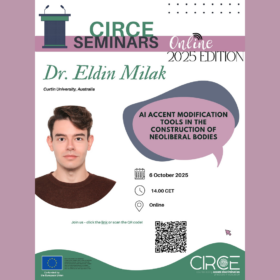
The Erasmus+ CIRCE project online seminar “AI accent modification tools in the construction of neoliberal bodies” will be held on 6 October 2025 at 2:00 PM – 3:00 PM (CEST). Speaker: Eldin Milak, Curtin University, Australia.
The free seminar, organised by the CIRCE project in collaboration with DFCLAM University of Siena, H2IOSC project and Cnr-Istituto di Linguistica Computazionale “Antonio Zampolli”, will be included in the H2IOSC Training Environment to enable all interested parties to access the event registration.
Speaker Bio
Eldin Milak is a Lecturer at School of Media, Creative Arts and Social Inquiry, teaching across sociology, anthropology, and Korean studies. He obtained his PhD in sociolinguistics from Sungkyunkwan University in Seoul, South Korea, as a Global Korea Scholar (GKS). His research explores the links between semiotic practices and personal identities, particularly within the dialectic of nationalism and globalization. He has published in a number of international journals in the fields of language and media, including Discourse, Context and Media, Language and Communication, and Applied Linguistics. His most recent edited volume ‘Becoming a Linguist’, published with Routledge, aims to introduce general audiences and aspiring linguists to the field. Eldin is the 2023 Korea Foundation Postdoctoral Fellow for Research in Australia and New Zealand, and a Fulbright Program Alumnus.
Summary
In this talk, I draw on Foucault’s notion of technologies of the self to critically examine the emerging practice of accent modification using generative AI tools. Framed within broader debates on the construction of neoliberal subjects and bodies in late-stage capitalism, the talk explores the tension between the subversive use of accent modification as an expression of personal agency and the structural reinforcement of ‘nativeness’ that such practices amplify. Drawing on examples from international call centers and social media, I illustrate how the self is (re)voiced in line with neoliberal imperatives of continuous personal ‘development’ and ‘growth.’ I conclude by reflecting on the implications of AI-mediated accent work for the politics of voice, identity, and inequality in a globalized economy, raising questions about whose voices are legitimized, and at what cost.

